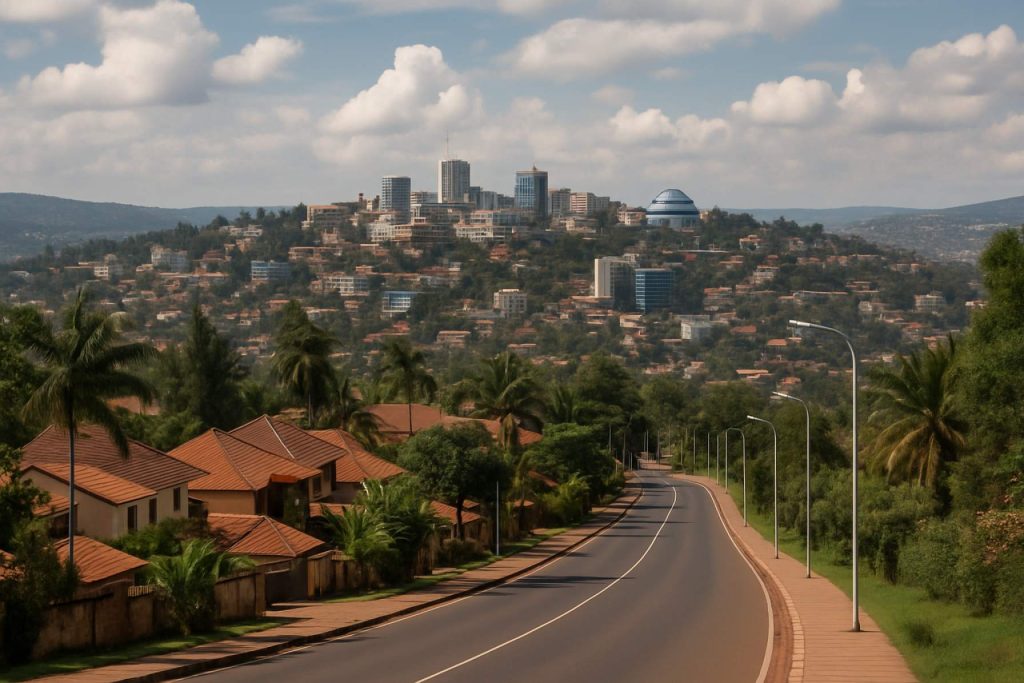
Kigali, Rwanda Travel Guide: Discover Africa’s Cleanest, Safest, Most Vibrant City
- Visa Hacks: How to Enter Rwanda Stress-Free
- Kigali’s Must-See Spots: Unmissable Sights & Attractions
- 48 Hours in Kigali: The Perfect Itinerary for First-Timers
- Eat Like a Local: Kigali’s Food Scene Revealed
- Safe Travels: What You Need to Know About Security in Kigali
- Getting Around Kigali: Transport Tips for Every Budget
- Where to Stay: Kigali’s Coolest Hotels & Guesthouses
- Weather Watch: When’s the Best Time to Visit Kigali?
- Budget Breakdown: How Much Does Kigali Really Cost?
- Hidden Gems & Instagrammable Spots in Kigali
Visa Hacks: How to Enter Rwanda Stress-Free
Visa Hacks: How to Enter Rwanda Stress-Free
Kigali, the clean and vibrant capital of Rwanda, welcomes travelers with a visa policy designed for ease and accessibility. Here’s how to ensure a smooth entry:
- Visa on Arrival: Citizens of all countries can obtain a 30-day single-entry visa on arrival at Kigali International Airport or land borders. The fee is typically USD 50, payable in cash or by card. Have exact change in USD or Rwandan Francs (Rwanda Directorate General of Immigration and Emigration).
- Visa-Free Countries: Nationals from member states of the African Union, Commonwealth, and La Francophonie receive a 30-day visa free of charge upon arrival.
- Online E-Visa: For extra peace of mind, apply online for a single-entry or transit visa before departure. Processing takes about three business days. Print your approval letter to present on arrival (Rwanda Directorate General of Immigration and Emigration).
- East Africa Tourist Visa: This multi-country visa allows travel between Rwanda, Kenya, and Uganda for up to 90 days, ideal for regional explorers. Apply at the first country of entry’s embassy or online.
- Required Documents: Bring a passport valid for at least six months past your entry date, one blank page, and proof of onward travel. Vaccination against yellow fever may be requested if arriving from a risk area.
- Arrival Tips: Fill out arrival forms on the plane or at the airport. Queue times are generally short, but have your documents ready for quick processing. Free Wi-Fi is available in the arrivals hall.
- Extensions: If you wish to stay longer, visit the immigration office in Kigali before your visa expires to apply for an extension.
Always check the latest entry requirements and advisories before you travel via the official Rwanda Directorate General of Immigration and Emigration portal.
Kigali’s Must-See Spots: Unmissable Sights & Attractions
Kigali, the capital of Rwanda, is a dynamic city that blends cultural heritage, poignant history, and modern energy. Known for its cleanliness and safety, Kigali is often the starting point for Rwandan adventures. Here are unmissable sights and attractions for every traveler:
-
Kigali Genocide Memorial: A deeply moving site honoring the victims of the 1994 genocide, this memorial offers exhibits, educational resources, and serene gardens for reflection. It’s a must-visit for understanding Rwanda’s history and resilience.
Kigali Genocide Memorial - Kimironko Market: The city’s largest market is a vibrant hub for local culture. Browse stalls selling fresh produce, crafts, fabrics, and souvenirs. Haggle politely for the best deals and soak in the lively atmosphere.
- Camp Kigali Memorial: This small but significant memorial marks the site where ten Belgian peacekeepers lost their lives at the start of the genocide. It’s a sobering but important stop for history buffs.
-
Inema Arts Centre: Kigali’s creative heart, Inema showcases contemporary Rwandan art and regularly hosts workshops, live music, and dance performances.
Inema Arts Centre - Kigali Convention Centre & Kigali Heights: The iconic dome-shaped Convention Centre lights up the city skyline and is surrounded by upscale shops, restaurants, and bars. Great for dining, nightlife, and panoramic city views.
- Nyamirambo Neighborhood: Known for its diverse community and vibrant street life, Nyamirambo offers guided walking tours, street food tastings, and a look into daily Rwandan life. The Nyamirambo Women’s Center offers excellent tours.
- Presidential Palace Museum: Located east of the city, this former home of President Habyarimana features exhibits on Rwanda’s modern history and the plane wreckage from 1994 in its gardens.
- Mount Kigali: For panoramic views, hike or drive to the top of Mount Kigali. The area is popular for horseback riding and offers a tranquil escape from the city bustle.
- Campaign Against Genocide Museum: Situated in the Parliamentary building, this museum details the Rwandan Patriotic Front’s efforts to end the genocide, with exhibits and guided tours.
-
Kandt House Museum of Natural History: Once the residence of German explorer Richard Kandt, this museum explores Rwanda’s natural environment and colonial history.
Institute of National Museums of Rwanda
Tips: Kigali is generally safe and walkable, though taxis and moto-taxis are widely available and affordable. Dress modestly for visits to memorials. Most attractions are open daily, but check ahead for public holiday hours. Card payment is increasingly accepted, but carrying some Rwandan francs is wise for markets and small vendors.
48 Hours in Kigali: The Perfect Itinerary for First-Timers
Day 1: Exploring Kigali’s Heart
- Morning: Start at the Kigali Genocide Memorial, a moving and essential site to understand Rwanda’s history. Allow 2–3 hours for the exhibits and serene gardens.
- Late Morning: Visit Kimironko Market for a slice of local life. Browse vibrant stalls selling crafts, fabrics, and fresh produce. Practice your bargaining skills and try tropical fruits.
- Lunch: Head to the stylish Heaven Restaurant for Rwandan and international cuisine in a leafy, open-air setting.
- Afternoon: Tour the Inema Arts Center, Kigali’s hub for contemporary art and live workshops. Meet local artists and shop for unique souvenirs.
- Evening: Catch the sunset with panoramic city views at Ubumwe Grand Hotel’s rooftop bar. For dinner, try local brochettes or grilled fish at a nearby bistro.
Day 2: Culture, Coffee, and City Vistas
- Morning: Book a coffee masterclass or tasting at Question Coffee, supporting women farmers. Learn about Rwanda’s specialty beans from crop to cup.
- Late Morning: Walk through Kandt House Museum for insight into Kigali’s colonial history and natural wonders. The museum offers English-language tours.
- Lunch: Enjoy local favorites like isombe (cassava leaves) at Repub Lounge with cityscape views.
- Afternoon: Stroll the green boulevards of Nyamirambo on a guided walking tour, sampling street food and learning about the city’s multicultural neighborhoods.
- Evening: End your stay with live music or jazz at Pili Pili, a popular hangout with wood-fired pizzas and a lively atmosphere.
Practical Tips
- Transport: Use local ride-hailing apps such as Yego for safe, cashless motorcycle or car rides. Taxis are widely available and affordable.
- Currency: Rwandan Franc (RWF). ATMs are plentiful, but cash is useful in markets.
- Connectivity: SIM cards are sold at the airport and telecom shops. Kigali offers good Wi-Fi in most hotels and cafes.
- Safety: Kigali is one of Africa’s safest capitals, but use standard precautions in busy areas.
- Dress: Kigali is cosmopolitan, but modest dress is appreciated in public places.
For more on Kigali, check the official tourism portal: Visit Rwanda.
Eat Like a Local: Kigali’s Food Scene Revealed
Eat Like a Local: Kigali’s Food Scene Revealed
Kigali, Rwanda’s vibrant capital, offers an exciting blend of traditional flavors and contemporary cuisine. Whether you’re seeking street eats or stylish restaurants, Kigali’s food scene is a must-explore for any traveler.
- Local Staples: Rwandan cuisine is centered around fresh, local ingredients. Don’t miss “Isombe” (cassava leaves cooked with peanuts), “Ugali” (stiff maize porridge), “Brochettes” (grilled meat skewers), and “Ibihaza” (pumpkin mixed with beans).
- Must-Try Experiences: Visit the bustling Nyamirambo neighborhood for authentic street food, including grilled corn, samosas, and chapati. The Kimironko Market is another hotspot where locals shop for produce and enjoy quick bites.
- Coffee Culture: Rwanda is famous for its high-quality coffee. Sip a cup at a local café such as Question Coffee or Inzora Rooftop Café, where beans are sourced directly from Rwandan cooperatives.
- Vegetarian Options: Rwandan diets feature several plant-based dishes, making Kigali vegetarian-friendly. Try “Akabenz” (fried pork, but often available with beans or plantains) and “Ibishyimbo” (spiced beans).
- Modern Dining: Kigali boasts a growing number of contemporary restaurants. Explore fusion menus at places like Heaven Restaurant, which blends Rwandan and international flavors, or enjoy fresh pastries at Brioche.
- Dining Tips: Rwandans eat dinner early, typically between 6–8 pm. Tipping (5–10%) is appreciated but not mandatory. Tap water is not potable—opt for bottled water in restaurants.
- Food Safety: Street food is generally safe, but choose busy stalls with high turnover. Carry hand sanitizer, and avoid raw or unpeeled produce if you have a sensitive stomach.
For more on Kigali’s food and travel tips, see the official tourism portal: Rwanda Development Board.
Safe Travels: What You Need to Know About Security in Kigali
Kigali, the capital of Rwanda, is widely regarded as one of Africa’s safest and cleanest cities. The local government has invested heavily in security and cleanliness, making it a comfortable destination for travelers. However, as with any international destination, it’s important to remain informed and vigilant.
- General Safety: Kigali has a low crime rate compared to many other African cities. Petty crime, such as pickpocketing or bag snatching, can occur, especially in crowded markets or at night. Remain aware of your belongings, and consider using a money belt or cross-body bag.
- Police Presence: The city has a visible and approachable police presence. If you need assistance, you can contact the Rwanda National Police by dialing 112 in an emergency.
- Transport Safety: Public transportation (buses and motorcycle taxis known as “motos”) is widely used and generally safe. Always wear a helmet on motos—drivers are required to provide one, and it’s illegal to ride without it.
- Nighttime Precautions: Kigali is safe after dark in most central areas, but it’s best to avoid walking alone in poorly lit or unfamiliar neighborhoods. Use reputable taxi services or ride-hailing apps for late-night travel.
- Scams & Tourist Awareness: Scams targeting tourists are uncommon but possible. Be cautious of unsolicited offers for tours or currency exchange. Always use official exchange bureaus and established tour operators.
- Health & Emergency: Kigali’s main hospitals and clinics offer good medical care. Carry basic health insurance and know the location of major hospitals. Emergency medical services can be reached by dialing 912.
- LGBTQ+ and Cultural Sensitivity: Rwanda is relatively conservative; public displays of affection are not common. While homosexuality is not criminalized, discretion is advised.
- Official Information: For the latest travel advisories and updates on safety in Kigali, consult your country’s embassy and the Government of Rwanda.
By practicing standard safety precautions and respecting local customs, most visitors find Kigali to be a secure and welcoming city for travel.
Getting Around Kigali: Transport Tips for Every Budget
Getting Around Kigali: Transport Tips for Every Budget
Kigali, Rwanda’s vibrant capital, offers a range of transportation options to suit every traveler’s budget and preference. Here’s how to get around efficiently, safely, and affordably:
- Taxi-Moto (Motorbike Taxis): The most popular and fastest way to navigate Kigali’s hilly roads. Fares are negotiable but usually range from 500 to 2,000 RWF depending on distance. Always wear the provided helmet and agree on the price before the ride.
- Yego Cabs (Metered Taxis): Kigali’s official taxi service uses metered fares, offering a safer and more transparent option. Book via the Yego app or hail at designated taxi stands. Fares start around 2,000 RWF for short trips. Credit cards are sometimes accepted, but cash is preferred.
- Public Buses and Minibuses: Affordable buses connect major neighborhoods. Fares typically cost 300–500 RWF per ride. Purchase a Tap&Go card at bus stations for cashless payment. Main bus terminals include Nyabugogo and Remera.
- Car Hire and Ride-Sharing: Several agencies offer rental cars; international driving permits are required. Ride-hailing apps like Yego and VW Move are reliable options for both short and long trips.
- Walking: Kigali is considered one of Africa’s safest and cleanest cities. Many central areas, including the business district and Kimihurura, are pedestrian-friendly with wide sidewalks.
-
Tips for Travelers:
- Carry small denomination Rwandan francs for transport fares.
- Download local apps like Yego for hailing taxis and paying fares.
- Public transport schedules are generally reliable but can get crowded during rush hours (7–9am and 5–7pm).
- English and French are widely spoken by drivers, but a few words of Kinyarwanda are appreciated.
For up-to-date transport regulations and further practical info, see the Government of Rwanda and Visit Rwanda websites.
Where to Stay: Kigali’s Coolest Hotels & Guesthouses
Kigali, Rwanda’s dynamic capital, offers a stylish mix of hotels and guesthouses for every type of traveler. Whether you’re seeking luxury, boutique charm, or budget-friendly comfort, here’s how to find your perfect base in the city.
- Kigali Marriott Hotel: A top choice for luxury and business travelers, the Marriott boasts spacious rooms, a tranquil pool, multiple restaurants, and excellent Wi-Fi—all centrally located. Book early for the best rates, especially during peak conference seasons. Marriott
- Heaven Boutique Hotel: Renowned for its social enterprise mission and inviting atmosphere, Heaven offers beautifully decorated rooms, a lush garden, and an acclaimed restaurant. Guests rave about the welcoming staff and sweeping city views. Heaven Rwanda
- Hotel des Mille Collines: Famous as the inspiration for the film “Hotel Rwanda,” this historic property features a central location, a large swimming pool, and a sense of local heritage. The hotel is a favorite for those interested in Kigali’s history. Mille Collines
- ONOMO Hotel Kigali: Offering modern design, vibrant decor, and a rooftop terrace, ONOMO is popular with younger travelers and digital nomads. The in-house café is a good spot for remote work or casual meetups. ONOMO Hotels
- Yambi Guesthouse: A standout budget option in the Nyamirambo neighborhood, Yambi combines friendly service with clean, airy rooms and a lively communal vibe. Breakfast is included, and the staff can help arrange tours and airport transfers.
Tips for Booking:
- Book well in advance for major events like the Kigali International Peace Marathon (June) and CHOGM if you want the best selection and rates.
- Most hotels and guesthouses offer airport pickups—confirm this when booking.
- Wi-Fi is generally reliable in midrange and upscale hotels; check recent reviews to confirm if you need to work remotely.
- For a local vibe, consider guesthouses in Nyamirambo or Kimihurura, where you’ll find hip cafés, art galleries, and nightlife within walking distance.
For official information on tourism and accommodation in Kigali, visit Visit Rwanda.
Weather Watch: When’s the Best Time to Visit Kigali?
Kigali, Rwanda’s capital, is known for its mild, temperate climate year-round thanks to its elevation (around 1,567 meters/5,141 feet above sea level). The city experiences two main dry seasons and two rainy seasons, making timing your visit important for comfort and activities.
- Best Time to Visit: The long dry season, from June to September, is considered the best time to visit Kigali. Expect sunny days, cooler temperatures (average highs of 25-27°C/77-80°F), and minimal rain—ideal for city exploration, gorilla trekking, and outdoor activities.
- Short Dry Season: December to February also offers pleasant weather, with some occasional showers but generally good conditions for sightseeing and travel.
- Rainy Seasons: March to May (long rains) and October to November (short rains) experience heavier rainfall, sometimes making rural roads muddy or impassable. While the city itself remains accessible, rain may affect views and outdoor plans.
- High Season: June to September sees more tourists and slightly higher prices for hotels and tours. Booking in advance is advisable during this period.
- What to Pack: Lightweight clothing, a light sweater (for cooler evenings), and a rain jacket or umbrella—especially if traveling during the rainy seasons.
- Quick Tip: Kigali’s weather is relatively consistent, but always check the forecast before arrival for any unusual weather events.
- More Information: For detailed forecasts and seasonal updates, consult the Rwanda Meteorology Agency.
Budget Breakdown: How Much Does Kigali Really Cost?
Overview
Kigali, the vibrant capital of Rwanda, offers a range of budget options for travelers. Known for its cleanliness and safety, the city caters to budget-conscious visitors with affordable accommodation, transport, and food. Here’s what to expect for typical daily expenses in Kigali.
- Accommodation: Budget hostels and guesthouses start from $12–$25 USD per night for a dorm bed or simple private room. Mid-range hotels range from $40–$80 USD per night. Airbnb options are also available and often cost $20–$40 USD for private rooms in central locations.
- Food: Local Rwandan meals at casual restaurants or “brochette” street stalls cost $2–$5 USD. International or mid-range dining can range $8–$15 USD per meal. Supermarkets and local markets offer fresh produce and groceries at reasonable prices.
- Transportation: Mototaxis (motorcycle taxis) are the most common way to get around, typically costing $0.50–$2 USD per ride depending on distance. City buses are even cheaper at under $0.30 USD per trip. Car hire and private taxis are available from $20 USD per day, but less common for budget travelers.
- Attractions & Activities: Entry to the Kigali Genocide Memorial is free, though donations are encouraged. City walking tours and museum visits may cost $5–$15 USD. Day trips to coffee farms or art galleries are usually $10–$30 USD, including transport.
- Internet & SIM Cards: SIM cards from major providers like MTN Rwanda or Airtel Rwanda are widely available. Expect to pay around $1–$2 USD for a SIM, with 1GB of data costing $1–$2 USD.
Typical Daily Budget (per person):
- Budget traveler: $25–$40 USD (dorm/hostel, local food, mototaxi, free/cheap attractions)
- Mid-range traveler: $50–$100 USD (private room, mix of local and international dining, short taxi rides, paid attractions)
Tips for Saving Money
- Eat where locals eat—try “milk bars” or neighborhood canteens for authentic Rwandan food.
- Use mototaxis for short trips, but always agree on the price before hopping on.
- Visit markets like Kimironko for affordable snacks, souvenirs, and fresh produce.
- Many hostels offer free walking tours—ask at reception for schedules.
- Tap water is not potable; buy large bottles to save or use filtered water stations where available.
For the most up-to-date travel advisories and official information, consult the Government of Rwanda.
Hidden Gems & Instagrammable Spots in Kigali
Hidden Gems & Instagrammable Spots in Kigali
- Nyamirambo Neighborhood: This lively district offers colorful street art, bustling markets, and vibrant local life. Join a walking tour with the Nyamirambo Women’s Center to discover authentic food spots and photogenic urban murals (Visit Rwanda).
- Mount Kigali Viewpoint: For sweeping city panoramas, hike or drive up Mount Kigali at sunrise or sunset. The views over Kigali’s rolling hills are perfect for wide-angle shots.
- Kimironko Market: Capture Kigali’s busy daily life at this sprawling market. The produce stalls, colorful fabrics, and friendly vendors create a dynamic backdrop for candid photos.
- Inema Arts Center: Founded by local artists, this vibrant contemporary art gallery offers striking installations and murals both inside and outdoors—ideal for creative Instagram content (Inema Art Center).
- The Kigali Genocide Memorial Gardens: While a place for reflection, the memorial’s peaceful gardens and architecture offer a solemn beauty. Photography is permitted in the outdoor areas, but visitors should be respectful (Kigali Genocide Memorial).
- Question Coffee Café: This social enterprise café is known for its lush courtyard, latte art, and educational coffee experiences. The outdoor seating is shaded by greenery and makes for cozy, shareable photos (Question Coffee).
- Camp Kigali Memorial: This lesser-known site commemorates Belgian peacekeepers and is surrounded by tranquil gardens, offering a peaceful and photogenic retreat within the city.
- Rebero Hill: For off-the-beaten-path views, head to Rebero Hill at golden hour. The hillside offers panoramic vistas of Kigali’s cityscape and is rarely crowded.
Tips for Travelers:
- Always ask permission before photographing people, especially in markets or residential areas.
- For the best light, visit outdoor spots early in the morning or late afternoon.
- Use local ride-hailing apps or moto-taxis for easy transport between locations.
- Check opening hours for galleries and memorials—some close for lunch or on public holidays.



